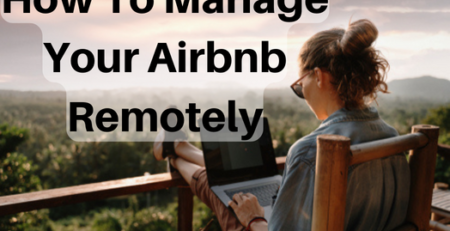How To Rent Your Vacation House Without A Property Manager
Renting out your vacation home can be a great way to make some extra money while you’re away. Not only can you rent your home out to tourists, but you can also rent it out to residents of your town or city. There are a number of reasons why renting out your home can be a great investment, but, how to rent your vacation house without a property manager? First of all, if you have a nice home that is in a desirable location, renting it out can be a great way to make some extra money for rental property owners. Secondly, renting out your home can be a great way to offset some of the costs of running a vacation rental investment. Finally, renting out your vacation rental property can yield significant returns if the house is located in a popular destination not far from amenities.
Are you thinking about renting out your vacation home, but don’t want to hire a property manager to handle the process? No problem! While vacation rental management can be helpful, they also come with added fees and may not be necessary for everyone. In this insightful article, we’ll provide tips on how to rent your vacation home without a property manager and take control of the process yourself. We’ll cover topics such as setting rates, marketing your property, short-term rental sites, handling reservations, and communicating with guests all while you manage your vacation rental remotely. By following these tips, you can confidently and efficiently rent out your vacation home without the added cost of a property manager.
Why You Should Consider Renting Out Your Vacation Home
There are many benefits to renting out your vacation home. Here are five of the most common:
- Additional Income:
You can generate additional income. This can be a great way to supplement your regular income. - Increased Exposure:
You increase your exposure. This can lead to more potential guests, which in turn can lead to increased income. - Reduced Costs:
When you rent out your home, you reduce the costs associated with owning and operating it. This can save you money in the long run. - Increased Flexibility:
You have more flexibility in terms of when and how you use it. This can allow you to take advantage of various opportunities that come your way. - Greater Control:
You have greater control over the property and its management. This allows you to focus on other aspects of your life while the home is managed for you.
Be Officially Prepared
 There are a few things you need to do before you start renting your vacation home out. First, you will need to gather the necessary paperwork. This includes preparing a lease agreement, rental agreement, and security deposit agreement. You will also need to get insurance and a property tax id. Once you have all of the necessary paperwork, it is time to start marketing your home. You can use online resources like Craigslist, or local newspapers and magazines. You can also put up flyers in local businesses and post them on public bulletin boards. You should also consider placing ads on vacation rental websites. Once you have generated a few inquiries, it is time to set up a rental appointment. You can do this by setting up a time for potential renters to come to look at your home. You should also provide them with a rental agreement and a security deposit agreement. Be prepared to answer any questions the renters may have. This includes explaining the property’s amenities, answering any questions about the rental agreement, and providing information about your property’s security system. Once the rental agreement is signed, you will need to prepare the home for rent. This includes cleaning the property, preparing the beds, and cleaning the bathrooms. You should also remove any trash and clean the exterior of the home. You should also make sure to advertise the rental availability online and in local newspapers and magazines. You should also keep a list of the dates and times that you will be available to rent the home, in case someone is interested in booking it. Overall, preparing to rent out your vacation home is a fairly simple process. However, it is important to be prepared with the necessary paperwork and marketing materials. This will ensure that you have a successful rental experience.
There are a few things you need to do before you start renting your vacation home out. First, you will need to gather the necessary paperwork. This includes preparing a lease agreement, rental agreement, and security deposit agreement. You will also need to get insurance and a property tax id. Once you have all of the necessary paperwork, it is time to start marketing your home. You can use online resources like Craigslist, or local newspapers and magazines. You can also put up flyers in local businesses and post them on public bulletin boards. You should also consider placing ads on vacation rental websites. Once you have generated a few inquiries, it is time to set up a rental appointment. You can do this by setting up a time for potential renters to come to look at your home. You should also provide them with a rental agreement and a security deposit agreement. Be prepared to answer any questions the renters may have. This includes explaining the property’s amenities, answering any questions about the rental agreement, and providing information about your property’s security system. Once the rental agreement is signed, you will need to prepare the home for rent. This includes cleaning the property, preparing the beds, and cleaning the bathrooms. You should also remove any trash and clean the exterior of the home. You should also make sure to advertise the rental availability online and in local newspapers and magazines. You should also keep a list of the dates and times that you will be available to rent the home, in case someone is interested in booking it. Overall, preparing to rent out your vacation home is a fairly simple process. However, it is important to be prepared with the necessary paperwork and marketing materials. This will ensure that you have a successful rental experience.
If you are thinking about renting out your vacation home this summer, there are a few things you need to do in order to make the process as smooth as possible. Here are five tips to help you get started:
1. Get organized
The first step is to get organized. This means preparing a list of what needs to be done in order to make your home rental ready. This might include cleaning, repairing, and updating any property details that need to be updated.
2. Set a rental price
Once you have a list of tasks to complete, it is important to set a rental price that is fair and reasonable. This will help you avoid any potential conflicts or disputes with potential renters.
3. Get the proper permits
If your home is in a vacation rental zone, you will need to get the proper permits in order to rent it out. This can include obtaining a rental permit from the municipality and getting the appropriate insurance.
4. Ensure your home is ready
Once you have all of the permits and paperwork in order, it is important to make sure your home is in the best possible condition. This includes checking for any damage, updating any property details, and cleaning up any messes.
5. Marketing your home
Finally, it is important to market your home and find potential renters. This can be done through online listings, print ads, or local advertisements. By preparing and marketing your home correctly, you should have no problem finding renters this summer.
Getting Started With Your Vacation Rental Property
 Renting out your vacation home can be a great way to make some extra money while you’re away. There are a few things to keep in mind when renting out your home, though, so that you can make sure that the experience is positive for both you and your guests.
Renting out your vacation home can be a great way to make some extra money while you’re away. There are a few things to keep in mind when renting out your home, though, so that you can make sure that the experience is positive for both you and your guests.
1. Make Sure Your Home Is In Good Condition
It’s important that your home is in good condition before you start listing it for rent. If it’s not, your guests may not be happy, and you’ll likely lose out on potential bookings. Make sure all the appliances are in working order, the paint is in good condition, and the exterior is tidy.
2. Keep Your Rental Rates Reasonable
Keep your rental rates reasonable. If you’re charging too much, you may end up losing potential guests. Try to find a rate that’s comfortable for you, but still allows you to make a bit of money.
3. Ensure your home is well-maintained
Your guests will also be looking for a clean home when they’re renting it out. Make sure to keep the home clean and tidy, and make sure all the appliances are in working order. This will help to make your home seem more like a home than a rental property.
4. Make Your Home Bright
Guests will also want to know that they can find their way around your home in the dark. Make sure to install adequate lighting, and make sure that the lighting is well-placed so that your guests can see where they’re going.
5. Make Sure You Have The Right Insurance
You need the right insurance. This will cover any damages that your guests might cause, as well as any losses that you may experience.
6. Have All Your Documentation In Order
You’ll also want to make sure that you have the right paperwork in place. This will include things like rental agreements, insurance policies, and property maintenance records. Having all of this information readily available will make it easier for you and your guests to manage the rental process.
Renting Out Your Vacation House Can Be A Great Way To Earn Extra Income And Offset The Costs Of Owning A Second House
 Managing a vacation rental can also be time-consuming and require a lot of effort. For this reason, many homeowners choose to hire a property manager to handle the details of renting out their vacation home. But what if you don’t want to pay the fees associated with a property manager? Is it possible to rent out your vacation home without one? How to rent your vacation house without a property manager is easier than you think.
Managing a vacation rental can also be time-consuming and require a lot of effort. For this reason, many homeowners choose to hire a property manager to handle the details of renting out their vacation home. But what if you don’t want to pay the fees associated with a property manager? Is it possible to rent out your vacation home without one? How to rent your vacation house without a property manager is easier than you think.
The answer is yes! While property managers can be helpful, they are not necessary for everyone. By taking a hands-on approach and following a few key strategies, you can successfully rent out your vacation home without a property manager.
Here are some tips for how to rent your vacation home without a property manager:
Set Competitive Rates:
The first step in attracting guests to your vacation home is setting rates that are competitive with other similar properties in the area. Research the going rates for similar properties in your area and consider factors such as the time of year, local events, and demand.
Market your property:
Once you have your rates set, it’s time to start marketing your vacation home. Utilize online platforms such as Airbnb and VRBO to list your property and reach a wider audience. Be sure to include high-quality photos and a detailed description of your home, as well as any amenities or features that make it stand out.
Handle Reservations And Communication With Guests:
When you receive a reservation request or booking, be sure to promptly communicate with the guest and confirm the details of their stay. Keep track of reservations and availability using a calendar or booking system, and make sure to follow up with guests before and during their stay to ensure that they have everything they need.
Manage Cleaning And Maintenance:
Without a property manager, you’ll be responsible for handling the cleaning and maintenance of your vacation home. Be sure to establish a cleaning schedule and procedures to ensure that the property is well-maintained and ready for guests.
By following these tips, you can confidently and efficiently rent out your vacation home without the added cost of a property manager. While managing a vacation rental can be a lot of work, it can also be a rewarding experience, both financially and personally. By taking control of the process yourself, you can have the satisfaction of knowing that you are making the most of your vacation home and creating memorable experiences for your guests.
Getting Noticed Is A “MUST” If You Want Your Rental Fully Booked
 When it comes to renting out your property, getting noticed online is crucial. With so much competition out there, it’s important to make sure that your rental stands out and attracts the right guests. Here are some tips for how to get your rental noticed online:
When it comes to renting out your property, getting noticed online is crucial. With so much competition out there, it’s important to make sure that your rental stands out and attracts the right guests. Here are some tips for how to get your rental noticed online:
Utilize online listing platforms:
There are many online platforms that allow you to list your rental property, such as Airbnb, VRBO, and HomeAway. These platforms have a large audience and can be a great way to reach potential guests. Be sure to create a detailed listing with high-quality photos and a compelling description of your rental.
Optimize your listing for search engines:
When creating your online listing, be sure to include relevant keywords that potential guests may be searching for. This will help your listing show up in search results when people are looking for a rental like yours.
Use social media to promote your rental:
Social media platforms such as Facebook, Instagram, and Twitter can be great ways to reach a wider audience and promote your rental. Consider creating a social media account specifically for your rental and post updates and photos to attract potential guests.
Reach out to local businesses and organizations:
Consider reaching out to local businesses and organizations to see if they would be interested in promoting your rental to their customers or members. This can be especially effective if you have a unique or specialized rental, such as a beach house or a ski chalet.
Offer incentives to guests:
Consider offering incentives to guests to encourage them to book with you. This could include discounts for longer stays, a bottle of wine upon arrival, or other perks.
By following these tips, you can get your rental noticed online and attract the right guests for your property. Remember, the more visibility your rental has, the more likely it is to be booked.
Always Aim To Attract Returning Guests
 As a vacation rental owner, it’s important to not only attract new guests but also keep them coming back. Repeat guests can be a valuable source of income and help establish a loyal customer base for your rental.
As a vacation rental owner, it’s important to not only attract new guests but also keep them coming back. Repeat guests can be a valuable source of income and help establish a loyal customer base for your rental.
Here are some tips for how to keep customers returning to your rental:
Provide a great guest experience:
The most important factor in keeping guests coming back is providing a great experience during their stay. This includes making sure the property is clean, well-maintained, and fully stocked with amenities. Respond promptly to any questions or concerns that guests may have and be available to assist them during their stay.
Offer loyalty rewards or incentives:
Consider offering loyalty rewards or incentives to guests who have stayed with you before. This could include discounts on future stays, free upgrades, or other perks. This will show your appreciation for their business and encourage them to come back.
Stay in touch after their stay:
Keep in touch with your guests after their stay and consider sending them updates and special offers. This could be in the form of a newsletter, email, or social media message. By staying connected, you’ll keep the rental top of your mind for future vacations. This is the secret to the success of Premier Point and its real estate growth.
Ask for feedback and make improvements:
After each stay, consider asking guests for feedback on their experience. This can provide valuable insights into what you’re doing well and areas where you can improve. Use this feedback to make necessary improvements and show your guests that you value their input.
Stay Up To Date On Rental Laws And Regulations In Your Local Area
When you are an owner of a rental property, you are likely aware of the various laws and regulations that affect your property business. However, it can be helpful to have a plan for addressing potential issues before they arise. This article provides tips for preparing for rental laws and regulations, including understanding your legal rights and responsibilities, creating a rental policy, and preparing for inspections. Understand Your Legal Rights and Responsibilities When you are an owner of a rental property, you have certain legal rights and responsibilities. First and foremost, you are responsible for meeting all state and local housing and health codes. This means that your property must be in accordance with all applicable building and health codes, and you must take appropriate measures to protect your tenants from health and safety hazards. You also have a responsibility to ensure that your property is properly maintained.
Finally, you are responsible for ensuring that your rental property is in compliance with all applicable zoning laws. Create a Rental Policy It is important to have a written rental policy in place. This policy should address the various rules and regulations that apply to your property, as well as the expectations of your tenants. It is also important to make sure that your rental policy is available to tenants upon request. Inspect Your Property It is important to regularly inspect your property to ensure that it is in compliance with all applicable laws and regulations. This includes checking for common problems (such as pipe leaks that would require a plumber or pests) and addressing any defects that are discovered. You should also schedule regular inspections for your property in accordance with state and local requirements. Preparing for rental laws and regulations can help you avoid potential issues. By understanding your rights and responsibilities, creating a rental policy, and regularly inspecting your property, you can minimize the chance of violating any regulations.
More Info On How To Rent Your Vacation Rental Property Without A Property Manager
 What Do Know Before You Go
What Do Know Before You Go
When you are considering whether or not to rent your vacation home without a property manager, it is important to understand the pros and cons of this decision. Here are the benefits and drawbacks of renting your vacation home without a manager:
Benefits of Renting Your Vacation Home Without a Manager
1. More Control Over Your Vacation Rental:
You have more control over the rental property. This means that you can decide when and how to rent the property, as well as who to rent it to.
2. More Flexible Scheduling:
You can easily reschedule your vacation if you need to. This is especially important if you have a tight schedule or if you need to take care of other responsibilities during your vacation.
3. Reduced Costs:
Depending on the type of property you are renting, renting your vacation home without a manager may reduce your overall costs. For example, if you are renting a condo, renting without a manager may reduce your cleaning costs.
4. Reduced Hassle:
You may avoid some of the hassle and hassles that come with renting a property. For example, you may not have to deal with property management fees or maintenance issues.
5. More Flexible Rental Periods:
If you rent your vacation home without a manager, you can often rent the property for a longer period of time. This may allow you to enjoy your vacation longer and save money in the process.
6. Reduced Risk:
You can reduce your risk of potential damage or loss to the property. This is because you could have better insurance than any other management agency.
Drawbacks of Renting Your Vacation Home Without a Manager
1. Increased Risk of Damage or Loss:
If you rent your vacation home without a manager, you are increasing your risk of damage or loss to the property. This is because you will have less control over the property and may not be familiar with the layout.
2. Increased Costs:
If you rent your vacation home without a manager, you may have to pay additional costs, such as property management fees or maintenance issues.
3. Increased Hassle:
You may experience increased hassle and stress when renting the property. This is because you will have to deal with property management fees and other issues that can arise during a vacation rental.
4. Less Flexible Scheduling:
If you rent your vacation home without a manager, you may have to reschedule your vacation if you need to. This may be difficult if you have a tight schedule or if you need to take care of other responsibilities.
5. Reduced Control Over the Property:
You could have less control over the property. This means that you may not be able to make changes to the property or use it the way you want.
6. Reduced Privacy:
If you rent your vacation home without a manager, other people who are renting the property may be able to see into your home. This may be less private than renting through a property manager.
Ultimately, renting your vacation home without a manager is a decision that you will have to weigh carefully. If you are comfortable with the risks and benefits, renting your vacation home without a manager may be a good option for you.
Conclusion
Renting your vacation house out without a property manager is possible and recommended if you can maintain the property yourself. As this article has covered, there is a lot of hard work that goes into managing a vacation rental. If you weigh up the time spent vs the cost of a vacation rental company handling all aspects, it might end up worthwhile hiring an agency to manage your vacation rental.
FAQs
How profitable are vacation rentals?
It’s difficult to give an average profit margin for vacation rental without more information, it is best to conduct a thorough financial analysis of the property in question to determine its potential profitability. If you invest in the perfect location you could expect to see 3% – 6% per year.
How do I make my vacation rental pay for itself?
To make your vacation rental pay for itself, set competitive prices, maximize occupancy, keep costs low, be efficient with utilities and services, explore other revenue streams, and look into tax benefits. Research similar properties in the area, use effective marketing and advertising to attract bookings, keep the calendar updated and fill any empty dates as soon as possible, choose cost-effective property management services and invest in energy-efficient appliances. Additionally, consider offering additional services such as concierge, bike rentals, and private chef experiences to increase income.
What percentage does VRBO take from the owner?
VRBO (Vacation Rentals By Owner) takes a percentage of the booking fee as a commission for listing the owner’s property on their platform. The commission percentage varies depending on the subscription plan chosen by the owner. VRBO offers three different plans for vacation rental owners:
The standard plan which is free but VRBO takes a commission of 5-10% on bookings.
The Premium plan which has a subscription fee, but VRBO takes a lower commission of 3% on bookings.
The Business plan which also has a subscription fee, but VRBO takes the lowest commission of 2% on bookings.
Can I make a living from vacation rentals?
To make a living from vacation rentals, one would need multiple properties generating consistent income, and a solid property management system in place to keep expenses low and maximize revenue. Additionally, it is important to market and advertises the property effectively to attract bookings.











